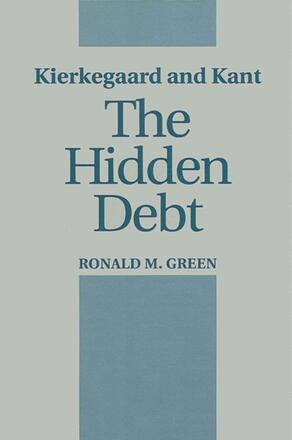
Kierkegaard and Kant
The Hidden Debt
Alternative formats available from:
Ronald M. Green is John Phillips Professor of Religion at Dartmouth College. His previous books include Religious Reason and Religion and Moral Reason.
Reviews
"The author, an accomplished Kant scholar, is quite right to refer to this work as a detective story. The working hypothesis is that Kierkegaard's understanding of and relationship to Kant and Kantian philosophy is much closer and more positive than is customarily recognized, and that the lack of recognition of this affinity is a result of Kierkegaard's attempts to 'obscure the degree of his indebtedness to the German thinker. '
"While much intellectual 'history' in this vein relies merely upon arguments from similarity and superficial comparisons, Green meticulously constructs a plausible historical case for his claims, both that Kierkegaard was intimately familiar with and deeply indebted to Kant's later works in ethics and philosophy of religion, and that Kierkegaard deliberately set about to hide the degree of this indebtedness. Green identifies the works by Kant that Kierkegaard owned and studied, chronicles the points of substantive contact, agreement, and disagreement between the two philosophers, and offers a reinterpretation of some of the most important Kierkegaardian themes in ethics and religion from the standpoint of this hidden indebtedness.
"In sum, this is a work of extraordinary originality, exhibiting the virtues of historical precision, literary grace, and philosophical substance. " — George R. Lucas, Jr.
"This work makes an original contribution to Kierkegaard scholarship and to philosophical discussion. Although some commentators have noted certain connections between the work of Kierkegaard and Kant, none has examined the issue in any detail. The complexity of the ideas with which Green works does not create confusing obscurity. Indeed, Green has a rare ability to define tangled issues in an understandable way. The use of the detective analogy to describe his undertaking is not only accurate but points to certain similarities with Kierkegaard's own work. " — Mark C. Taylor
"This book undertakes an exciting project. It dramatically closes the chasm that has divided Kierkegaard and Kant. Some are at home with Kierkegaardian talk of Passion, the Absurd, and 'Leaps of Faith. ' But an abyss lies — or seemed to lie — between such Kierkegaardians and those 'on the other side' who embrace Kantian Rationality, Science, and Moral Rectitude. Through exhaustive coverage of the primary texts, Green shows definitively that Kierkegaard's infamous views on the 'contradictions' between morality, reason, and faith are mirrored, point by point, in Kant's work. Through Green's detailed exposition, we discover a Kant whose reflection on radical evil creates an antimony not unlike Kierkegaard's teleological suspension of ethics; simultaneously, we discover a Kierkegaard who understood and assimilated more of Kant than anyone has hitherto suspected. " — Edward F. Mooney